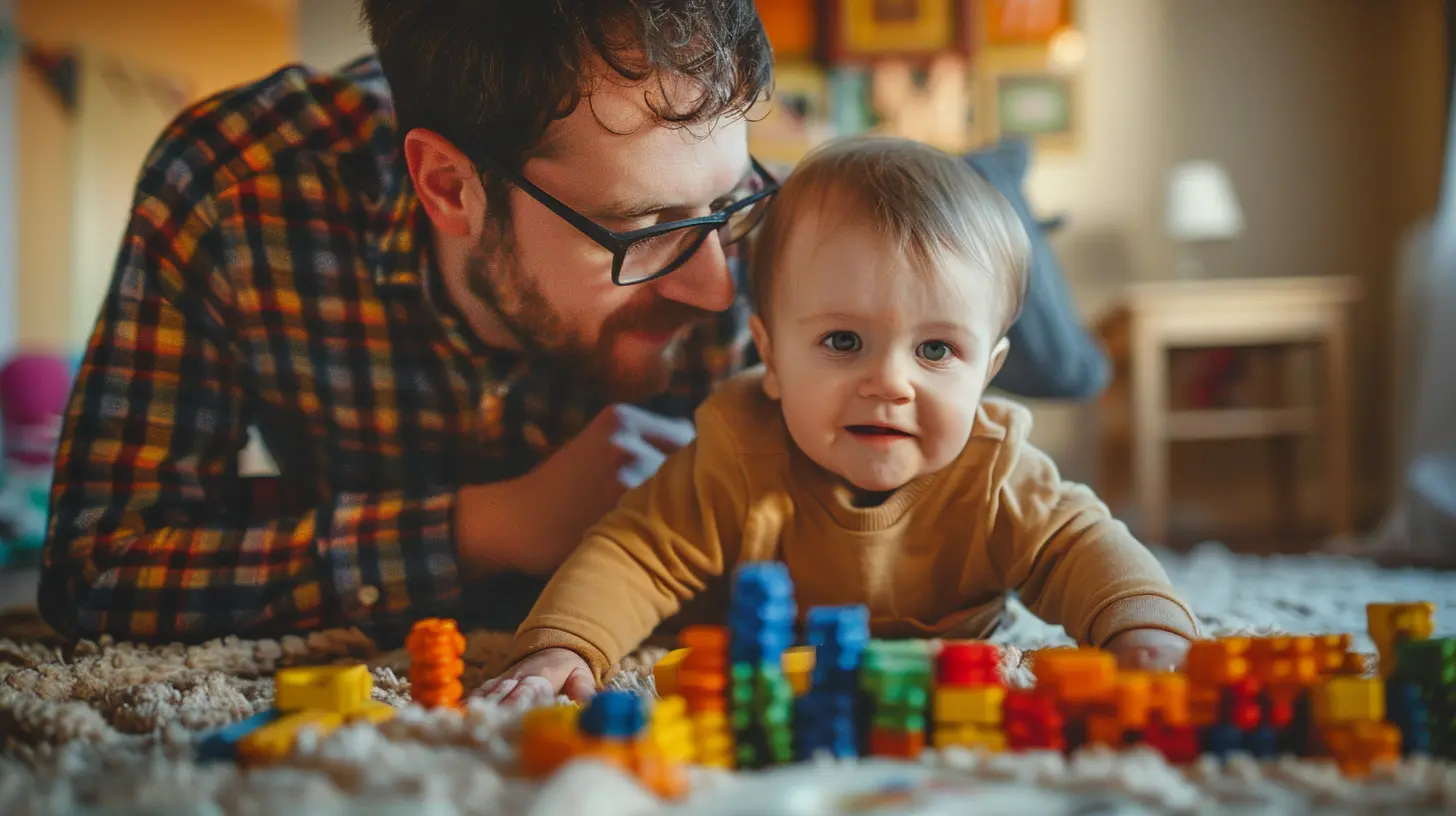The Role of Fathers in Early Childhood Development
27 April 2025
When most people think about early childhood development, the image that often comes to mind is the nurturing mother caring for her child. But what about fathers? While mothers undeniably play a crucial role, the role of fathers in early childhood development is equally important. In fact, research shows that fathers have a profound impact on their child's emotional, social, and cognitive development. So, let's dive a little deeper into how dads contribute to their child's growth and why their involvement is so essential.

The Importance of Fatherhood in a Child’s Life
Think about it: children are like sponges, soaking up everything from the world around them. And dads are a huge part of that world. Whether it's teaching life skills, offering emotional support, or providing a sense of security, fathers leave a lasting impression on their children.But it’s more than just being present physically. Active involvement—genuine, hands-on participation—makes all the difference. When fathers engage with their children, it fosters strong bonds that benefit both the child and the father. Let’s break down some key areas where fathers make a significant impact.

Emotional Development: The Power of Presence
Providing Emotional Support
Fathers are often seen as the "protectors" or "providers," but they also play a vital role in shaping a child's emotional intelligence. When fathers are emotionally available and attuned to their child's needs, they help create a sense of security and trust. This emotional bond lays the groundwork for healthy relationships later in life.For instance, a child who feels safe and supported by their father is more likely to develop self-confidence and resilience. When a father listens to his child’s concerns, offers comfort, and provides guidance, the child learns how to manage their own emotions. It’s like having a sturdy anchor in the stormy seas of life.
Teaching Emotional Regulation
Ever noticed how kids can sometimes be little emotional rollercoasters? One minute they’re laughing, the next minute, they're throwing a tantrum. Fathers play a key role in teaching their kids how to ride those waves of emotion. Through modeling calm behavior and providing consistent emotional support, fathers can help their children learn how to regulate their feelings.In fact, studies have shown that children with involved fathers are often better at managing stress and are less likely to develop behavioral problems. This is because fathers provide a different kind of emotional interaction than mothers, offering a balanced approach to emotional development.

Cognitive Development: Sharpening the Mind
Fathers as Teachers and Role Models
Fathers are natural teachers. Whether they realize it or not, dads are constantly showing their children how to solve problems, think critically, and explore the world. And no, this doesn’t mean sitting them down for a formal lesson. It’s in the little things—showing them how to fix a toy, encouraging curiosity during a nature walk, or even playing a game that develops strategic thinking.These everyday interactions stimulate a child’s brain and lay the foundation for cognitive development. Research indicates that children with actively involved fathers often perform better academically and are more likely to develop strong problem-solving skills. Dads help foster a curious mind, and that curiosity is the fuel for lifelong learning.
Language and Communication Skills
Surprisingly enough, fathers also play a crucial role in language development. Fathers tend to use a broader range of vocabulary when interacting with their children, which can help expand the child's language skills. This isn't to say that mothers don't do the same, but research shows that fathers often engage in conversations that challenge children to think more critically and express themselves more clearly.For example, a father might ask his child, “Why do you think the sky is blue?” This kind of open-ended question encourages the child to think deeply and articulate their thoughts, boosting both language and cognitive development.

Social Development: Building Relationships
Learning Through Play
Have you ever noticed how dads and kids play differently than moms and kids? Fathers often engage in more physical and rough-and-tumble play. While it might look like just a game, this type of interaction is actually teaching kids valuable social skills.When fathers engage in playful activities, they help their children learn about boundaries, cooperation, and competition. It’s not just fun and games—it's also a lesson in social dynamics. This type of play encourages children to take risks, manage their emotions, and work through conflicts—all important life skills.
Developing Independence
Fathers tend to encourage independence in their children, often pushing them out of their comfort zones. While this might feel a bit scary at first (for both the child and the dad!), it’s a crucial part of social development. When fathers give their children room to explore and make mistakes, they’re teaching them how to navigate the world on their own.This doesn’t mean dads leave their kids to fend for themselves. Rather, they offer a balance of support and freedom, allowing the child to develop autonomy while knowing they have a safety net to fall back on. This independence fosters self-reliance and confidence, two traits that are essential for building healthy relationships as they grow older.
The Impact of Father Absence
Of course, the absence of a father—or an emotionally unavailable father—can have significant consequences for a child’s development. Studies have found that children who grow up without an active father are at a higher risk of developmental delays and behavioral issues. They may struggle with emotional regulation, have difficulty forming relationships, and even face challenges in academic performance.This doesn’t mean that children raised by single mothers or in fatherless homes are doomed to fail. Other male role models, such as uncles, grandfathers, or family friends, can step in to fill the void. But it does highlight the importance of having a strong male figure in a child's life.
The Changing Role of Fathers in Modern Society
Traditionally, fathers were seen as the breadwinners—the ones who went to work while mothers stayed home to care for the kids. But times have changed. Today, more and more fathers are taking on active roles in parenting, whether that means staying home with the kids, sharing the responsibilities equally, or simply being more hands-on in their child’s daily life.This shift is a positive one. Studies show that children benefit greatly from having fathers who are actively involved in their upbringing. And it's not just the children who reap the rewards. Fathers who are engaged in their children’s lives report higher levels of satisfaction and happiness in their own lives. It's a win-win situation for everyone involved.
Practical Tips for Fathers to Get Involved
So, how can fathers make a meaningful impact on their child’s early development? Here are some practical tips:1. Spend quality time together: Whether it’s reading a bedtime story, playing a game, or going for a walk, the time you spend with your child is invaluable.
2. Be emotionally available: Let your children know that it's okay to express their feelings and that you’re there to listen and support them.
3. Encourage curiosity: Foster a love of learning by encouraging your child to ask questions and explore the world around them.
4. Set boundaries, but be flexible: Discipline is important, but make sure your child knows that boundaries come from a place of love, not control.
5. Be a role model: Your actions speak louder than words. Show your child what it means to be a kind, responsible, and compassionate person.
6. Get involved in daily routines: Helping out with everyday tasks like bathing, feeding, or homework not only strengthens your bond but also shows your child that you're a team.
Conclusion
Fathers play an irreplaceable role in early childhood development. Whether it’s helping kids develop emotionally, cognitively, or socially, dads have a unique and lasting impact on their children. While the role of fathers has evolved over time, one thing remains the same: dads are essential to a child's growth and well-being.So, if you’re a dad reading this, remember that your presence, love, and involvement make all the difference. And if you're someone who knows a father, it’s worth recognizing and appreciating the important role they play in shaping the next generation.
all images in this post were generated using AI tools
Category:
Child DevelopmentAuthor:

Paulina Sanders
Discussion
rate this article
3 comments
Lucy Ramirez
Fathers, your presence is a superpower in early childhood development! Your love, laughter, and support shape little minds in incredible ways. Keep shining your light—it makes all the difference!
May 4, 2025 at 4:54 AM

Paulina Sanders
Thank you for highlighting the vital role fathers play in childhood development! Your words beautifully capture the importance of our presence and support.
Will Roberts
Fathers play a crucial role in early childhood development by influencing emotional security, cognitive growth, and social skills. Their active involvement fosters resilience and positive relationships, shaping well-rounded individuals.
April 29, 2025 at 3:26 PM

Paulina Sanders
Thank you for highlighting the essential role fathers play in early childhood development. Their involvement truly makes a lasting impact on children's emotional and social growth.
Rebecca Jackson
Fathers play a crucial role in shaping emotional security and resilience in children. Their involvement fosters strong bonds, promoting healthier development and brighter futures. Let's celebrate their impact!
April 27, 2025 at 4:50 PM

Paulina Sanders
Thank you for highlighting the vital role fathers play in child development! Their involvement truly lays a strong foundation for emotional security and resilience.



